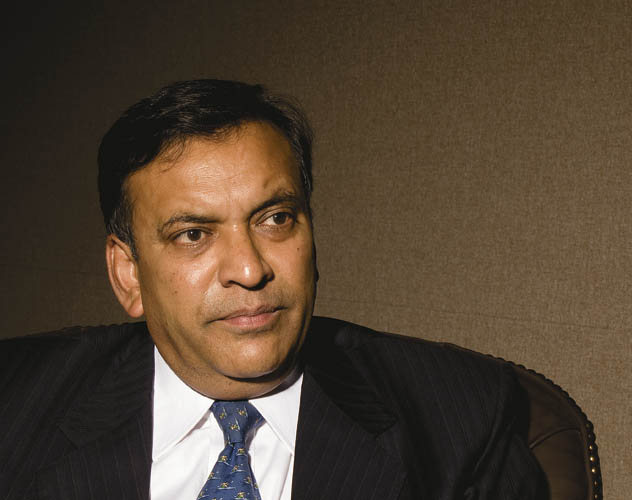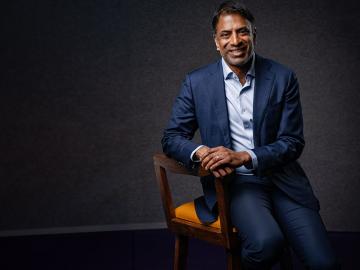
Akhil Gupta: Dreaming Big
For Akhil Gupta, deputy CEO of Bharti Enterprises, dealing with new challenges — and raising money for them — has never been a problem
When you began this journey, did you know where you were headed?
If you ask me today, did you dream about it then — absolutely not. What we were dreaming about at that time was Delhi. Then, we began dreaming about North India. We soon figured this is the business we can handle. JT Mobile was our first big bet. It was our first shift in strategy — acquiring Karnataka and Andhra. To raise that kind of massive funding was a huge task. Our big break came from Telecom Italia in 1995. It gave us ample money. Even with Warburg Pincus, we were able to raise money at the right time. In financial deals, we realised, right timing was important. We weren't worried about the best valuation.
I would credit it to our ability to dream bigger than what we could. We were constantly increasing and stretching our ambitions. There are three components to our success: We were very ambitious in settling our business model. Everything the Western world said we debunked. Our passion and conviction that we were thinking logically and right.
Business lessons that you have learnt?
After [the] first few years of being in mobile services, we realised the importance of price points. And, we also figured that to succeed in business we need to have the following: That total revenue should keep going up. That our operational expenses should keep coming down. And, we also looked at capital productivity — sales as [a] percentage of capex and not vice versa.
Tell us about some of the difficult moments in your journey?
Our first tough moment came in 1994 when we were trying to seek a Rs 11-crore debt from IDBI. When Reliance launched, it was a difficult moment for us. Most people wrote us off. But we decided to preserve our energies and keep our head down.
Sunil and I have never worked in large companies and we faced many management challenges. But one thing we always made sure — that before you roll out any project you should have adequate finance. While setting up the projects your hands should not be tight.
On structuring the first big outsourcing deal?
We realised that capex in mobile business is very modular. It became very clear to us that we were looking at massive capex. And, we also figured that we can’t be running everything ourselves.
On thinking about outsourcing, we tried to answer three things: Who can service [the] customer better, who can attract better human capital and economies of scale.
Was there any philosophy behind the diversifications, the non-telecom businesses?
All these businesses are at early stages of growth in the country. They cater to the masses and, hence, are scalable. India remains one of the most under-insured countries. In these industries (retail, insurance), we haven’t even touched the tip of the iceberg.
There was a certain scale-up that you expected from non-telecom businesses. How has been the journey so far?
I would say mostly in line (with our expectations).
Really?
Pretty much on track. Retail may look slow. But that’s how we planned. We wanted to have the backend in place. I would say, pretty much ok.
The sense that I get while talking to people in the industry is that the insurance business isn’t doing very well. It is really at the bottom of the heap.
When we entered insurance, we were 16th. You are right. It’s not that we have become No. 5 in the last two years. But that’s the nature of the business. You have to build up your branches, cover territories, appoint agents, [etc].
We have exited the investment managers’ business. But, we are fully committed to the other two...
Are you saying the growth is up to your expectations?
Yes.
Seriously?
The pace we had thought of, it’s more or less there in the initial period. Of course, we will come to an inflection point from where we should grow faster.
When do you see that inflection point?
Maybe by next year.
What’s the chemistry between the partners?
Very good. Very good. Excellent.
The management control in the insurance venture remains with Axa?
We have an independent management there. We are there on the board. But, of course, they know the business better in terms of products, policies.
The sense I am getting is, Axa venture isn’t where it was supposed to be and there’s some kind of disappointment at your end?
Axa is a giant in this business — but it’s not a reckless kind of giant. Insurance companies should never be reckless. They are taking ample time to develop business. We don’t want them to rush to appointing agents — and take short-term growth. We have to determine our own pace. Over a period of time, we would be climbing the ladder. Life insurance has tremendous scope.
Tell us about your global plans?
It is a big step. We want to be a global company. We respect the individualities and peculiarities of [the] local culture. We will try and bring the Indian model — which is based on [a] low-cost inclusive and volume-based [model].
We would like to ensure that we don’t do everything there.
Any guiding principle behind your global foray?
Any company that looks international looks at areas where they have deep knowledge. Also, we need to rely on local realities — and must not aim at running it from India. It’s a partnership — we need to work on our synergies.
What has changed between last year and this year about the MTN deal?
This time the construct is different. Earlier, Reliance had come as an interloper. This time it is more on the partnership mode. We are looking at Johannesburg — not global — listing.
Do you foresee any challenges in countries like Iran?
Absolutely not. It will be a transformational deal. It will enable us to learn from emerging markets.















